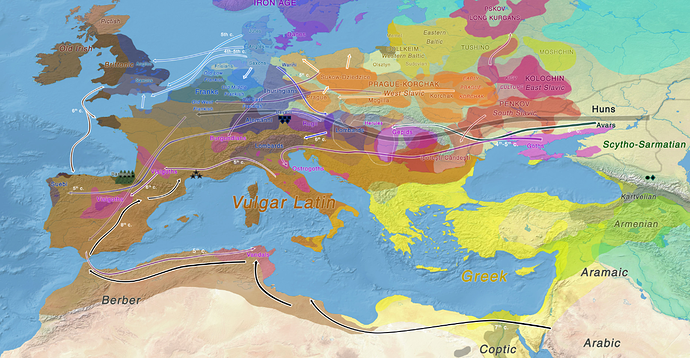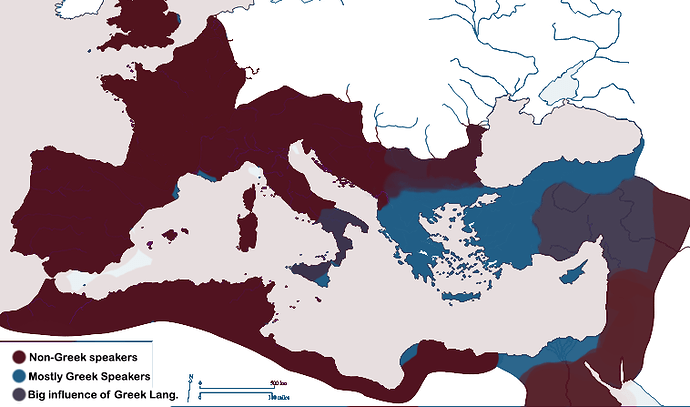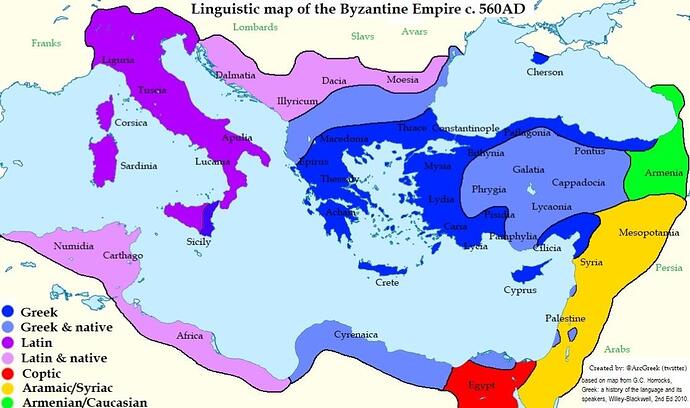There are 3 civs now that speak lating or italian. Byzantines historically for the most part of their historical existence spoke Greek. The official language after the 7th century was greek. Latin were used in the beginning of the eastern roman empire mainly from the officials and military. Gradually latin language was not used since people (villagers) always used to speak greek and many officials were greeks. Not only greek was used mainly in byzantium but it was the aristocrates’ language in Rome as well. Most of important document were written in greek. What is today english was back then the greek language.
Finally, consindering that different languages of civ in the game make it more interesting and fun, it is a pitty that greek as a language (or even a distinct civilization) exist. From military to science ancient greeks were the cradle of western civilization. Historical battles, bravery, military inventions, strategic influence, history (as science), art, philosophy… they did everything, they started everything.
It’s a pitty to have a war game with civs spanning from dark age to imperial and not have greeks (hellenes) among them or some specific civ related to them. You made sicilians which were a mixture of italians and greeks (based on history again) and you don’t have Spartans or Athenians or Macedonians or Thebans. At least make the byzantines speak greek since you consider them greeks and historically greek language was mostly used in the byzantine empire.
Sources for the language issue
From britannica:
Byzantine Greek language, an archaic style of Greek that served as the language of administration and of most writing during the period of the Byzantine, or Eastern Roman, Empire until the fall of Constantinople to the Turks in 1453. During the Byzantine period the spoken language continued to develop without the archaizing tendencies of the written language. Byzantine Greek is still the liturgical language of the Greek Orthodox church.
From wikipedia Byzantine empire - Language
Apart from the Imperial court, administration and military, the primary language used in the eastern Roman provinces even before the decline of the Western Empire was Greek, having been spoken in the region for centuries before Latin.[242] Following Rome’s conquest of the east its ‘Pax Romana’, inclusionist political practices and development of public infrastructure, facilitated the further spreading and entrenchment of the Greek language in the east. Indeed, early on in the life of the Roman Empire, Greek had become the common language of the Church, the language of scholarship and the arts, and to a large degree the lingua franca for trade between provinces and with other nations.[243] Greek for a time became diglossic with the spoken language, known as Koine (eventually evolving into Demotic Greek), used alongside an older written form (Attic Greek) until Koine won out as the spoken and written standard.[244]
The emperor Diocletian (r. 284–305) sought to renew the authority of Latin, making it the official language of the Roman administration also in the East, and the Greek expression ἡ κρατοῦσα διάλεκτος (hē kratousa dialektos) attests to the status of Latin as “the language of power.”[245] In the early 5th century, Greek gained equal status with Latin as the official language in the East and emperors gradually began to legislate in Greek rather than Latin starting with the reign of Leo I the Thracian in the 460s.[32] The last Eastern emperor to stress the importance of Latin was Justinian I (r. 527–565), whose Corpus Juris Civilis was written almost entirely in Latin. He may also have been the last native Latin-speaking emperor.[32]
The use of Latin as the language of administration persisted until the adoption of Greek as the sole official language by Heraclius in the 7th century. Scholarly Latin rapidly fell into disuse among the educated classes although the language continued to be at least a ceremonial part of the Empire’s culture for some time.[246] Additionally, Latin remained a minority language in the Empire, mainly on the Italian peninsula, along the Dalmatian coast and in the Balkans (specially in mountainous areas away from the coast), eventually developing into various Romance languages like Dalmatian or Romanian.[247]
Many other languages existed in the multi-ethnic Empire, and some of these were given limited official status in their provinces at various times.[248] Notably, by the beginning of the Middle Ages, Syriac had become more widely used by the educated classes in the far eastern provinces.[249] Similarly Coptic, Armenian, and Georgian became significant among the educated in their provinces.[250] Later foreign contacts made Old Church Slavic, Middle Persian, and Arabic important in the Empire and its sphere of influence.[251] There was a revival of Latin studies in the 10th century for the same reason and by the 11th century knowledge of Latin was no longer unusual at Constantinople.[252] There was widespread use of the Armenian and various Slavic languages, which became more pronounced in the border regions of the empire.[248]
Aside from these languages, since Constantinople was a prime trading center in the Mediterranean region and beyond, virtually every known language of the Middle Ages was spoken in the Empire at some time, even Chinese.[253] As the Empire entered its final decline, the Empire’s citizens became more culturally homogeneous and the Greek language became integral to their identity and religion.[254]
Here you can read a big debate in a history forum about Byzantion and its languages



